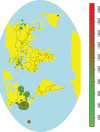The Carbon Footprint of Conference Papers
- PMID: 23840496
- PMCID: PMC3694072
- DOI: 10.1371/journal.pone.0066508
The Carbon Footprint of Conference Papers
Abstract
The action required to stem the environmental and social implications of climate change depends crucially on how humankind shapes technology, economy, lifestyle and policy. With transport CO2 emissions accounting for about a quarter of the total, we examine the contribution of CO2 output by scientific travel. Thankfully for the reputation of the scientific community, CO2 emissions associated with the trips required to present a paper at a scientific conference account for just 0.003% of the yearly total. However, with CO2 emissions for a single conference trip amounting to 7% of an average individual's total CO2 emissions, scientists should lead by example by demonstrating leadership in addressing the issue.
Conflict of interest statement
Figures



References
-
- Moss RH, Edmonds JA, Hibbard KA, Manning MR, Rose SK, et al. (2010) The next generation of scenarios for climate change research and assessment. Nature 463: 747–756. - PubMed
-
- Rockström J, Steffen W, Noone K, Persson Å, Stuart Chapin F III, et al. (2009) A safe operating space for humanity. Nature 461: 472–475. - PubMed
-
- Rogelj J, McCollum DL, Reisinger A, Meinshausen M, Riahi K (2013) Probabilistic cost estimates for climate change mitigation. Nature 493: 79–83. - PubMed
-
- Broome J (2008) The ethics of climate change. Scientific American 298: 96–102. - PubMed
-
- Burke IC (2010) Travel trade-offs for scientists. Science 330: 1476. - PubMed
MeSH terms
Substances
LinkOut - more resources
Full Text Sources
Other Literature Sources
Medical

